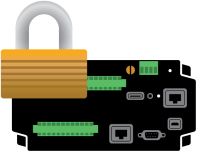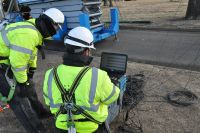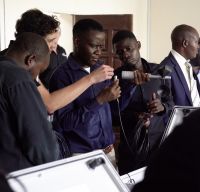The Campbell Scientific Blog Your source for useful how-to information and helpful expert advice
Displaying 1 - 20 of 163 articles
How to Use Data Logger Security Codes
Author: Janet Albers | Last Updated: 03/04/2025 | Comments: 4
Security codes are the oldest method of securing a data logger. They can effectively prevent innocent tinkering and discourage wannabe hackers—actions that could potentially wreak havoc on the integrity of your data. In this article, I’ll discuss the different security codes and how to use... read moreHow do you know if your CR6 is maxed out?
Author: Eric Schmidt | Last Updated: 02/18/2025 | Comments: 1
Just how many AM16/32B multiplexers can you really add to your CR6 Automated Monitoring Platform? At what point do you hit the limit? What is truly safe? As an Application Engineer in Campbell Scientific’s Infrastructure Group, I get a lot of customer questions about squeezing the... read moreBehind the Scenes: Scientifically Adding Some Jingle to the Holidays
Author: Eric Schmidt | Last Updated: 12/17/2024 | Comments: 0
Music has always been a part of my life—ten years of piano, six of oboe, and countless performances in bands and symphonies. So, when I joined Campbell Scientific and learned about vibrating wire sensors, my brain got excited for the musical potential. The result? Crackmeters... read moreWhat’s the impact of stress and strain in structural health monitoring?
Author: Eric Schmidt | Last Updated: 11/05/2024 | Comments: 3
How much is too much? Did you know that stress and strain can negatively impact your infrastructure? In this blog article, I’ll share a brief explanation of what you should know to protect the health of your critical structures. Infrastructure across the US and around the... read moreWhy should you use a data logger as an RTU in your SCADA system?
Author: Eric Schmidt | Last Updated: 10/21/2024 | Comments: 0
In today’s world of industrial automation, the ability to remotely monitor and control operations is more critical than ever. Imagine managing a water treatment plant, an electrical grid, or an environmental monitoring system from miles away—all without missing a beat to ensure smooth, efficient operations.... read moreHow do you future-proof your data-acquisition project?
Author: Michael Adams | Last Updated: 09/03/2024 | Comments: 1
As we approach the three-decade mark for some of our long-term data-acquisition projects, the question arises: “What does it take to ensure these systems continue to thrive far into the future?” How do you protect your investment and reap the most financial return? The Importance of... read moreOpen the Door to Unlock Flexibility
Author: Eric Schmidt | Last Updated: 08/20/2024 | Comments: 1
What’s inside your data-acquisition system enclosure? If you look inside, will you find a CR6 Automated Monitoring Platform that can unlock flexibility with unmatched reliability for your field research and data collection needs? For these reasons, the CR6 is an ideal choice for researchers and... read moreHow to Optimize Your Data Acquisition
Author: Michael Adams | Last Updated: 07/02/2024 | Comments: 0
Think of yourself as a chef in a high-end restaurant, crafting a delicate soufflé. Just as precise temperature control in your oven is crucial to achieving the perfect rise and texture, accurate temperature measurement is vital in scientific and industrial applications. But what if your... read moreHow to Enhance Your Data-Acquisition Capabilities
Author: Michael Adams | Last Updated: 06/18/2024 | Comments: 0
Imagine upgrading your car with the latest technology—all without needing to purchase a brand-new vehicle! At Campbell Scientific, we’re doing just that for data acquisition. Our innovative controller area network peripheral interface (CPI) protocol is like a high-tech upgrade for your automated monitoring platform, enhancing... read moreHow to Achieve Unmatched Vibrating Wire Speeds
Author: Michael Adams | Last Updated: 06/04/2024 | Comments: 0
In today's fast-paced world, accurate and rapid data acquisition is crucial. You can meet this critical need by capturing your data at unprecedented speeds of up to 200 times per second. I’ll explain how in this blog article. Pioneering Data Acquisition I’m excited to say that,... read moreIn Her Own Words: An Interview with a Recent Campbell Scientific Training Course Participant
Author: Ramatoulaye Nabi | Last Updated: 05/23/2024 | Comments: 0
In our ongoing exploration of employee training in environmental monitoring, we turn the spotlight to the real-life experiences of those who have benefitted from Campbell Scientific's training programs. Today, we chat with Anca Tarcu, Senior Meteorological Officer at Met Éireann (The Irish Meteorological Service). Anca recently... read morePutting People First: Crafting Cost-Effective Solutions with Campbell Scientific
Author: Michael Adams | Last Updated: 05/07/2024 | Comments: 0
Who doesn’t want an infrastructure solution that has a low cost of ownership through flexibility and expandability? This aspect is crucial in every decision we make, as it directly impacts the value we bring to our customers. At Campbell Scientific, our guiding principles revolve around putting... read moreA Deeper Look: Our Role in the Hole
Author: Michael Adams | Last Updated: 04/23/2024 | Comments: 0
Have you read the South Dakota: Rock Stability in Large Underground Excavation case study? It’s a short and interesting read, so check it out if you haven’t already. In this blog article, we’ll take a deeper look at Campbell Scientific’s role in a large-cavern, hard-rock... read moreHow to Equip Your Workforce for Success Through Training
Author: Vim Mistry | Last Updated: 03/25/2024 | Comments: 0
Continuous learning in the environmental monitoring industry empowers individuals and organizations alike, fostering innovation, user engagement, and a growth mindset. If you haven’t read our “How Do You Put Learning into Action?” blog article, I encourage you to do so. In this article, we’ll shift... read moreHow Do You Put Learning into Action?
Author: Vim Mistry | Last Updated: 03/11/2024 | Comments: 0
While continuous learning in the field of environmental monitoring is important, it’s even more critical to put that learning to practical use. Understanding the benefits for both employees and organizations to stay up to date on technology, expand expertise, and improve performance is one thing.... read moreA Closer Look: Resolving Dam Data Discrepancies
Author: Eric Schmidt | Last Updated: 03/05/2024 | Comments: 0
Did you read our Southwest: Solving the Mystery of Erroneous Dam Monitoring Data case study? Want to get some more details? In this article, we’re going to take a closer look at that case study. If you haven’t read the case study yet, please do... read moreCalibration Essentials: Importance
Author: Michael Jacobs | Last Updated: 03/04/2024 | Comments: 2
In the world of measurement and data acquisition, ensuring instrument accuracy is paramount. Regular calibration is essential to maintaining the integrity of your measurements and safeguarding your operations. But what exactly is calibration, and why is it so important? In this three-part blog series, we’ll explore... read more4 Reasons Why Continuous Learning Is Critical for Environmental Monitoring
Author: Ramatoulaye Nabi | Last Updated: 02/01/2024 | Comments: 0
In the ever-evolving landscape of environmental monitoring, staying ahead of the curve is not just a luxury but a necessity. As technology advances at an unprecedented pace, organizations must equip their employees with the skills and knowledge to effectively use emerging tools and navigate the... read moreHow to Easily Replace and Update a CS223 Sensor Head
Author: Ajay Singh | Last Updated: 01/15/2024 | Comments: 0
Campbell Scientific’s CS223 Pt-1000 Class A, Back-of-Module Temperature Sensor (discontinued effective 31 October 2023) has been replaced by the CS241 Pt-1000 Class A, Back-of-Module Temperature Sensor. When needed, you can replace the CS223 sensor head with a CS241 head without having to replace the entire... read moreWhy Is the CR6 the Preferred Automated Monitoring Platform for Geotechnical Applications Worldwide?
Author: Michael Adams | Last Updated: 01/08/2024 | Comments: 0
If you’re not using a CR6 Automated Monitoring Platform for your geotechnical application, you may be missing out on some key benefits that could help ensure the success of your instrumentation and monitoring network. Based on my 30 years of experience with data-acquisition systems, I’ll... read more






























